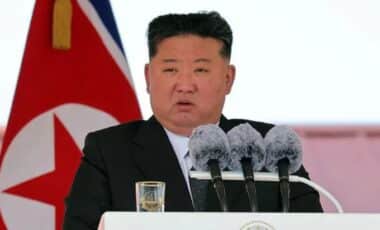In the early 1950s, there was no news story so scandalous and titillating as that of the Rosenbergs. However, historians generally agree that the two were in fact guilty.
The Makings of a Spy
The Rosenbergs both hailed from New York. Julius was a member of the Young Communist League USA in college, graduating from the City College of New York in 1939 with a degree in electrical engineering. Julius’ wife, Ethel, dreamed of acting and singing, but became a secretary at a shipping company. She met Julius through the Young Communist League, where she was also a member.
 Ethel Rosenberg’s mugshot.
Ethel Rosenberg’s mugshot.
After Julius’ college graduation, he took a job at the Army Signal Corps Engineering Laboratories in New Jersey, working there throughout World War II. He worked there for five years before his communist support was discovered; however, this still gave him plenty of time to discover important U.S. research on weaponry and emerging technology.
 Julius Rosenberg’s mugshot.
Julius Rosenberg’s mugshot.
It’s believed that Julius was recruited by the People’s Commissariat for Internal Affairs, a type of Soviet secret police, in 1942. During his time with the organization, he provided tons of classified reports, and also recruited other Americans for Soviet service. He found some quite useful recruits, including those who were able, under his supervision, to supply the Soviets with thousands of secret documents, including designs for the very first U.S. jet plane. During this time, Ethel’s brother, David Greenglass, was working on none other than the Manhattan Project. It was Julius’ goal to recruit him, so as to gain information regarding the project, and he succeeded in this goal and exceeded it by recruiting an additional engineer, who could provide information on how to manufacture weapon-grade uranium.
After World War II, it was rather surprising how quickly the Soviets were able to put together a nuclear test, especially considering that the United States never shared this information with the Soviets willingly, despite their being allies. The Soviets staged their first nuclear test in 1949. The next year, U.S. investigators found that a German physicist working as part of the Manhattan Project had delivered documents to the Soviets. The man pointed fingers toward his own link to the Soviet, Harry Gold. Gold was a chemist who knew Ethel’s brother David, and he was quickly figured out as well.
 Ethel’s brother, David Greenglass.
Ethel’s brother, David Greenglass.
From there, it was downhill for the Rosenbergs. David claimed that Julius was the mastermind behind it all, and that Julius was a secret passer and recruiter.
You may also like:
The Trial
In 1950, government officials met to discuss the Rosenberg case. They felt it was critical to hang the threat of a death penalty over their heads, so that Julius might break and reveal his wealth of knowledge regarding Soviet workings and espionage to officials. In addition, it was noted that the case against Ethel was relatively weak, but that she must be convicted as well, at all costs.
 Ethel and Julius Rosenberg, after their incarceration.
Ethel and Julius Rosenberg, after their incarceration.
Unfortunately for Ethel, her sister-in-law broke down in her second interrogation and admitted Ethel’s inner workings within Julius’ affairs, and her intimate knowledge of all the events that were transpiring. in August of 1950, Ethel testified before a grand jury and refused to answer any questions. Leaving the courthouse, she was arrested by FBI agents. She was not given leave to make arrangements for her children. Both Ethel and Julius faced pressure to give up other members of their spy ring, but both refused to talk.
The trial began in March of 1951. The prosecution was using David against Julius and Ethel, with David professing that he gave Julius a cross-section sketch of the atomic bombs dropped on Nagasaki and Hiroshima. He then said that Ethel typed up notes on nuclear secrets. Both Julius and Ethel pleaded the fifth. Within just 23 days, both were convicted and sentenced to death shortly after.
The judge, Irving Kaufman, stated that he felt the Rosenbergs were somewhat responsible for the Korean War. Handing over nuclear information to the Soviets, he said, caused the Communist activity in Korea, and that the Korean War would alter the course of history in years to come.
In response, Julius claimed that the entire trial was a political frame-up, and that his and his wife’s situation was meant to send a message to the American left. He felt the higher ups in the country needed a way to stir up enough hysteria and fear among the American people, so that the Korean War would become socially acceptable.
As the case received high attention in the media, a small campaign emerged to attempt to stop the execution. Protests were held and many claimed antisemitism played a role in the case. Philosophers and great minds of the day highly disagreed with the outcome of the trial as well, calling it a witch hunt. Even the Pope at the time asked Eisenhower to allow the couple to live. The President refused all appeals.
After the Trial
 Robert in 2007.
Robert in 2007.
The Rosenbergs were executed via electric shock, with Julius dying after the first shock. Ethel, however, survived four shocks and died after the fifth, at which point witnesses said smoke rose from her scalp. Approximately 500 people attended the funeral, with 10,000 waiting outside the service. During the Cold War, the Rosenbergs were the only Americans executed for espionage.
Later, it was discovered that, while the Rosenbergs did provide the Soviets with information, the information they did provide was of little use and impact in regards to the building of the Soviet atomic bomb. Former Soviet agents additionally reported that Julius was of no help when it came to the nuclear program.
 Michael in 2011.
Michael in 2011.
David later admitted that he fabricated his testimony convicting Ethel and Julius, in order to protect himself and his family. He did not express remorse over his decision, claiming that the safety of his wife and children was and should be more important to him than that of his sister.
The Rosenberg’s two children, Michael and Robert, were orphaned after the deaths of their parents and no relative stepped forward to adopt them. They spent years trying to prove their parents were innocent. Both wrote several books regarding their experience, and founded the Rosenberg Fund for Children, which supports children of targeted liberal activists. Most recently, the two have asked the Obama administration to realize the wrongful conviction and execution of Ethel.








